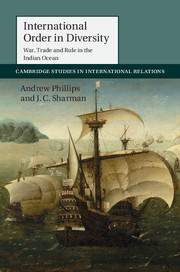Book contents
- Frontmatter
- Contents
- List of maps
- List of tables
- Acknowledgements
- Introduction
- 1 The puzzle of durable diversity in International Relations
- 2 The initial growth of diversity, 1500–1600
- 3 The expansion of diversity and competition under heteronomy, 1600–1650
- 4 The stabilization of diversity, 1600–1750
- 5 Reconfiguring diversity in the age of empire, 1750–1900
- Conclusion: Order in diversity
- Bibliography
- Index
- CAMBRIDGE STUDIES IN INTERNATIONAL RELATIONS
2 - The initial growth of diversity, 1500–1600
Published online by Cambridge University Press: 05 May 2015
- Frontmatter
- Contents
- List of maps
- List of tables
- Acknowledgements
- Introduction
- 1 The puzzle of durable diversity in International Relations
- 2 The initial growth of diversity, 1500–1600
- 3 The expansion of diversity and competition under heteronomy, 1600–1650
- 4 The stabilization of diversity, 1600–1750
- 5 Reconfiguring diversity in the age of empire, 1750–1900
- Conclusion: Order in diversity
- Bibliography
- Index
- CAMBRIDGE STUDIES IN INTERNATIONAL RELATIONS
Summary
In establishing the expanding diversity of the Indian Ocean system in the 1500s, two polity forms are central to our argument. The first is the statist model represented by the Portuguese, who first entered the Indian Ocean when Vasco da Gama's expedition rounded the Cape of Good Hope in December 1497 as part of the king's strategy to find Christian allies and spices in the East. The Portuguese quickly carved out a maritime domain that was subordinated to royal authority in Lisbon through a viceroy (based in Goa) who governed all the far-flung Portuguese possessions in the East.
The second is the realm created by the Mughals after their push south into India from Central Asia from 1526. A superpower of their day, the Mughals governed a huge and vastly wealthy territory that was organized along classically imperial lines. As such, like the Safavid and Ottoman Empires further to the west, the Mughals adopted a layered, gradated political structure, in which important sovereign prerogatives were delegated to subordinate rulers, and authority was conceived in terms of proximity or distance from the person of the emperor.
While it is a fundamental tenet of today's sovereign state system that none is entitled to command and none obliged to obey, this presumption of equality is very much the exception rather than the rule in historical terms, given the past prevalence of empires and heteronomous international systems. In the Indian Ocean system, and indeed in most others, it was entirely unremarkable for many, perhaps even most, actors within that system to acknowledge in some way the authority of some superior polity. In this way more minor polities are also part of our story, like the tributary sultanates of the East African Swahili Coast, the subordinate polities owing fealty to the Mughal emperor, or the ‘galactic’ polities of South-East Asia.
- Type
- Chapter
- Information
- International Order in DiversityWar, Trade and Rule in the Indian Ocean, pp. 67 - 101Publisher: Cambridge University PressPrint publication year: 2015



